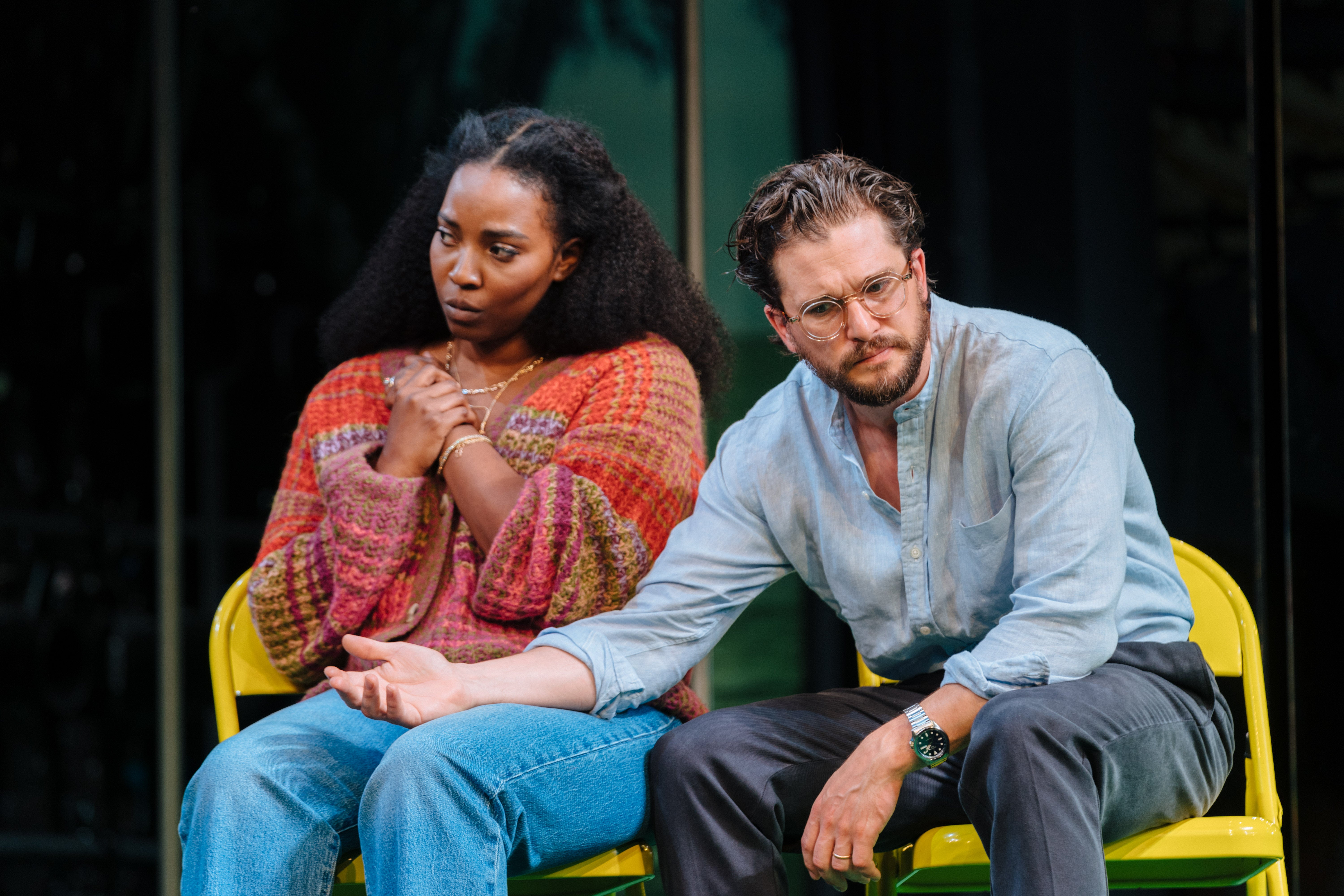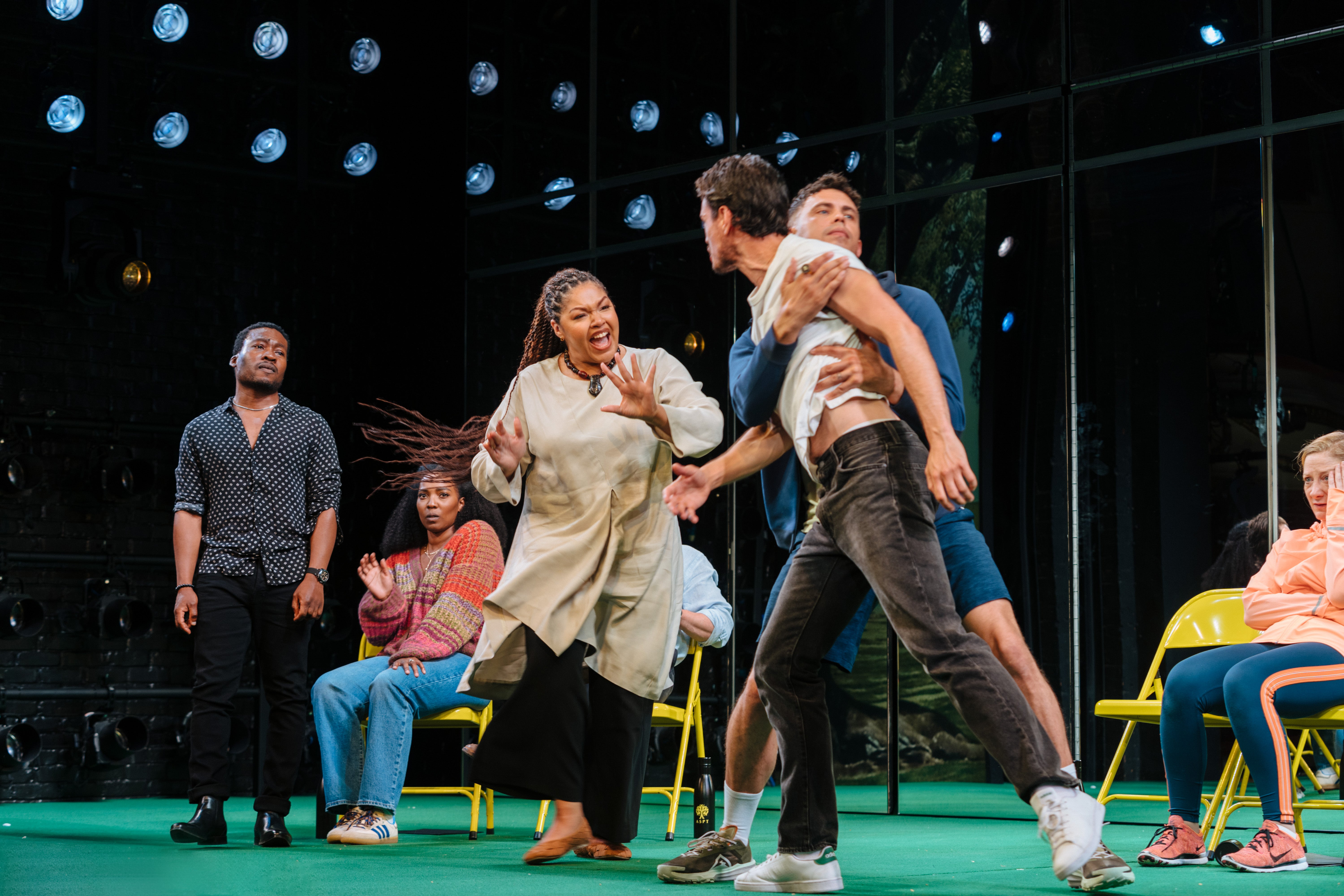Slave Play review: Jeremy O Harris’s sensational show is not an easy watch – but a necessary one
Therapy sessions, dildos, Rihanna, and an exposing performance from Kit Harington... ‘Slave Play’ has finally arrived – loudly – in London, and it’s a sharp, intelligent, multi-layered satire

Your support helps us to tell the story
From reproductive rights to climate change to Big Tech, The Independent is on the ground when the story is developing. Whether it's investigating the financials of Elon Musk's pro-Trump PAC or producing our latest documentary, 'The A Word', which shines a light on the American women fighting for reproductive rights, we know how important it is to parse out the facts from the messaging.
At such a critical moment in US history, we need reporters on the ground. Your donation allows us to keep sending journalists to speak to both sides of the story.
The Independent is trusted by Americans across the entire political spectrum. And unlike many other quality news outlets, we choose not to lock Americans out of our reporting and analysis with paywalls. We believe quality journalism should be available to everyone, paid for by those who can afford it.
Your support makes all the difference.The best-known work by controversial American playwright Jeremy O Harris begins like the most messed-up bedroom farce imaginable. Three interracial couples play out master-slave sexual scenarios, whips cracking and slurs flying in front of an electrified audience whose brains almost tangibly crackle and short-circuit as they work out how to react. Poker face? Performative horror? Or just awkward laughter at the buttock-wobbling spectacle of a Southern-accented white woman decked out like a toilet-roll dolly, brandishing her grandmother’s dildo? It’s a crude opening that mirrors the nuance-free media storm around Slave Play. When it premiered on Broadway in 2019, the cast received death threats. When its West End run announced that some performances would be reserved for Black audiences as part of the “Black Out nights” initiative, an official spokesperson for the then prime minister Rishi Sunak condemned the idea as “wrong” and “divisive”.
But there’s something far more multi-layered and deft about Slave Play than first appearances might suggest. The first act’s costume-drama trappings soon fall away, ruffles replaced by sharp-edged psychological insights in a second act set in a group therapy session. Rihanna’s song “Work” stitches these two halves together, its lyrics even written in neon across Clint Ramos’s set. At first it feels like a Bridgerton-era witty anachronism, but soon it’s more like the internal monologue of Kaneisha (Olivia Washington), who’s going round in circles as she work, work, works away at her relationship with emotionally stunted white guy Jim (Kit Harington), trying to unearth her buried desire for him. Will she find it if he calls her “negress”? Or makes her eat melon off the floor? She’s trying to find out at a therapeutic retreat for Black partners in interracial relationships who are affected by anhedonia – an inability to feel pleasure – which is presided over by cringey sex researchers Teá (Chalia La Tour) and Patricia (Irene Sofia Lucio), who think that role-play might be the answer.
Gay couple Gary (Fisayo Akinade) and Dustin (James Cusati-Moyer) are trying their best to play along, Gary’s sexual reawakening dampened by Dustin’s hilariously convoluted refusal to recognise that he benefits from white privilege. And so are Alana (Annie McNamara) and her much younger boyfriend Phillip (Aaron Heffernan), who don’t want to admit the twisted appeal of their relationship’s racialised power dynamic. There’s a lot here that might resonate more with American audiences – both the therapy-speak, with talk of “processing” and “holding space”, and the historical context, which might feel distant to a UK audience educated via a curriculum that’s been largely scrubbed clean of this country’s deep and grubby involvement in the slave trade. But English Jim offers a bit of a way in – he sees the therapy as “starting fires where there were none”, before gradually coming to feel the history burning in Kaneisha’s memory. And perhaps in her body, too – there’s a subtle thread of reference here to the theory of epigenetics, which posits that trauma from generations ago lingers on in our genes.
So much of the play centres on Kaneisha’s struggle to understand and give voice to what’s happening inside her. But as Alana points out – while talking over her taciturn partner Phillip – it’s the white people whose feelings dominate the conversation.

Harris’s play is full of a sharp satirical intelligence that makes the right words fall from the wrong mouths, and resists pat conclusions. It’s never an easy watch – and its Black Out nights feel like an important gesture to Black audiences who don’t want white discomfort to define their experience of it. But it is a necessary one, showing how old power structures linger, covered over by messy, fleshy protuberances of desire.
Noël Coward Theatre, until 21 September
Join our commenting forum
Join thought-provoking conversations, follow other Independent readers and see their replies
Comments